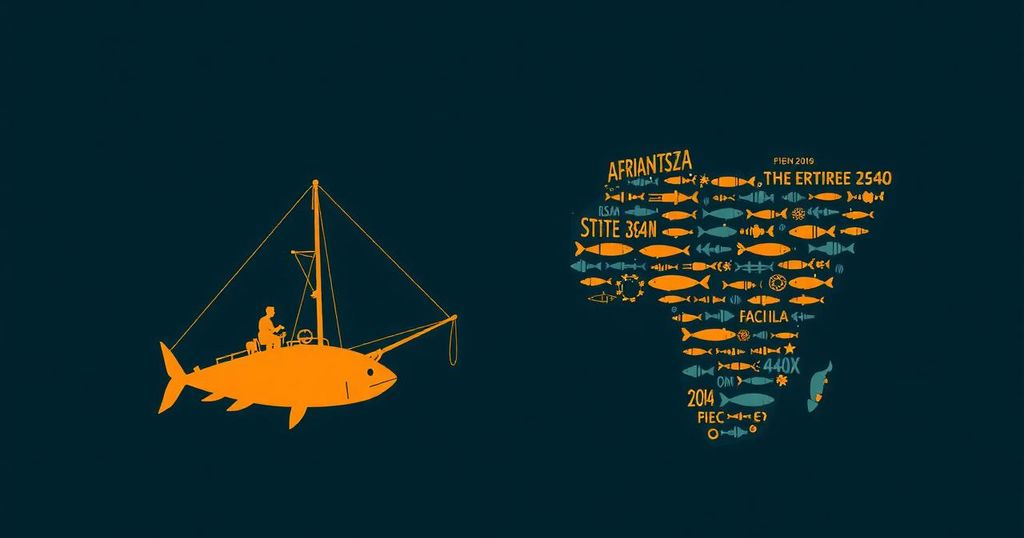China Strengthens Fisheries Alliances with Seychelles and Guinea-Bissau
Summary
China is intensifying its fisheries partnerships with Seychelles and Guinea-Bissau, focusing on enhancing bilateral relations through strategic investments in fisheries and infrastructure. Chinese officials recently met with Seychelles Fisheries Minister Jean-François Ferrari, while in Guinea-Bissau, rising Chinese fishing activities coincide with EU disengagement. There are concerns regarding the long-term impacts of China’s predominant role in Guinea-Bissau’s economy.
In late August, the Chinese Ambassador to the Seychelles, Lin Nan, led a delegation from the China Distant-Water Fishing Association in a meeting with Seychelles Fisheries Minister Jean-François Ferrari. Minister Ferrari expressed a keen interest in exploring the possibilities of enhancing collaboration in the fisheries sector and blue economy with China, aiming to jointly advance bilateral relations. This engagement exemplifies China’s strategic outreach to numerous African nations to leverage their fisheries resources, with the Seychelles serving as a pivotal hub for tuna fishing and processing within the Indian Ocean region. Furthermore, a recent report by Planet Tracker highlighted the significant financial interests the Chinese government has in the fishing trade, indicating that deepening ties with Seychelles aligns with China’s historical economic actions in the region. During the Forum on China-Africa Cooperation (FOCAC), held from September 4 to 6, Seychelles President Wavel Ramkalawan joined several leaders in Beijing, where numerous announcements concerning aid and trade agreements were anticipated. In addition to Seychelles, Guinea-Bissau has witnessed similar developments, with Chinese investments expanding in its fisheries sector. Notably, the CNFC Overseas Fishery Bissau Office Head, Sun Zhi Xiang, received recognition from Guinea-Bissau’s government for his contributions to the nation’s economy. During a recent three-day visit to China, Guinea-Bissau’s President Umaro Sissoco Embalo pledged to intensify cooperation between the two countries. Currently, over 70 Chinese fishing vessels operate in Guinea-Bissau’s waters, a notable increase coinciding with a reduced European Union presence. Lusofona University Professor of Sociology, Diamontino Lopes, remarked that while China has successfully completed the Bandim port project, the European Union’s commitments to upgrade the aging port have yet to materialize. He noted concerns regarding the opaque nature of the EU’s involvement in Guinea-Bissau’s fisheries sector, stating, “The port entrance is still dirty and silted up. Large ships still cannot dock there.” Professor Lopes further emphasized that China now stands as the predominant partner for Guinea-Bissau across multiple sectors, with a lack of serious alternatives, raising apprehensions regarding the future of its international relationships.
The intricate relationship between China and African nations regarding fisheries resources has gained significant attention in recent years. The Seychelles, positioned strategically within the Indian Ocean, serves as a crucial center for tuna fishing and processing. As competition for these resources intensifies, countries like China are increasingly engaging with African nations, seeking cooperation that yields mutual economic benefits. Recent events, such as the Forum on China-Africa Cooperation, have further catalyzed discussions and agreements concerning trade and development in the fisheries sector, notably involving investments in ports and fishing infrastructure in countries like Guinea-Bissau and the Seychelles.
The ongoing partnerships between China and countries like the Seychelles and Guinea-Bissau underline a strategic pivot towards deepening economic ties, particularly in the fisheries sector. With significant investments and collaborative efforts, both nations stand to benefit from enhanced development opportunities. However, the growing reliance on China raises pertinent questions regarding diversification of economic partnerships and the implications for local economies amid shifting global dynamics.
Original Source: www.seafoodsource.com








Post Comment